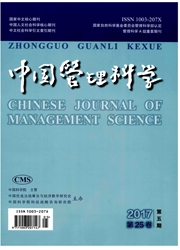

 中文摘要:
中文摘要:
针对常规产品与再制品销售市场的纵向差异和常规材料价格随机波动的情况,建立了“制造商一回收商”Stackelberg博弈模型,设计了考虑常规材料价格信息更新的两阶段回收费用共担再制造供应链契约协调机制,证明了两阶段可变契约的效益高于单阶段固定契约。算例分析表明两阶段可变契约的有效性:常规材料价格随机波动幅度越大,两阶段契约的改善程度越高;且协调机制能麴鼓励废旧产品的再制造,实现经济效益与社会效益的双赢。
 英文摘要:
英文摘要:
Based on the vertical differentiation between normal and remanufactured products in marketing and considering normal materials' stochastic price, the "manufacturer-retailer" Stackelberg models are es- tablished. With normal materials' price information updating, the coordiantion mechanism of two-stage re- trieving-expense-sharing contract of remanufacturing supply chain is designed. It is proved that the two- stage adjustable contract is more efficient than the one-stage fixed contract. The effectiveness of the two- stage adjustable contract is then shown by means of the numerical analysis: the wider the fluctuating range of normal materials' price, the more efficient the contract works; the coordinating mechanism in the paper can promote remanufacturing and achieve a win-win goal of both economic and social benefits.
 同期刊论文项目
同期刊论文项目
 同项目期刊论文
同项目期刊论文
 The Closed-Loop Supply Chain Network Equilibrium with Products Lifetime and Carbon Emission Constrai
The Closed-Loop Supply Chain Network Equilibrium with Products Lifetime and Carbon Emission Constrai 期刊信息
期刊信息
